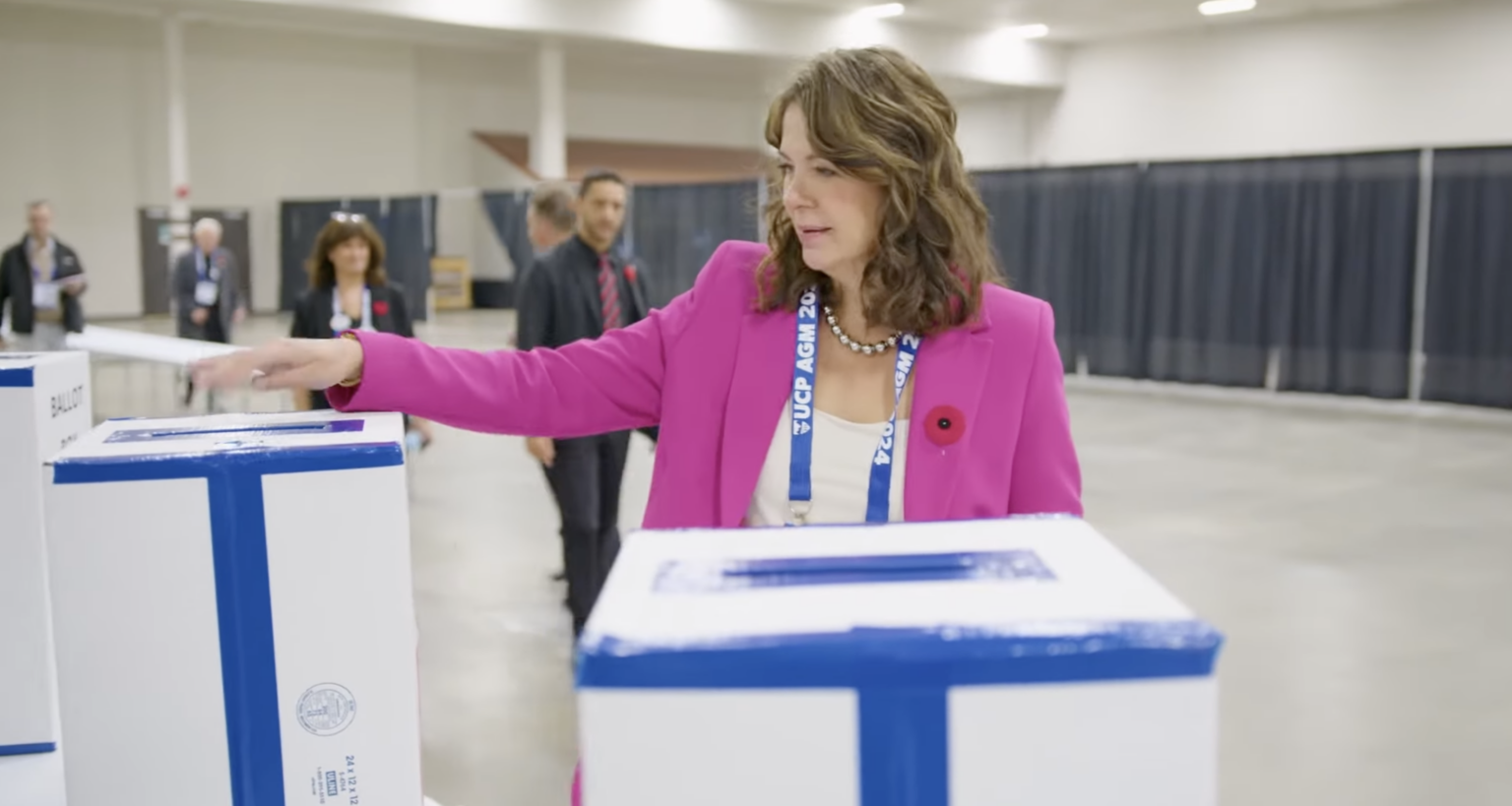Just days after Alberta’s ruling United Conservative Party voted to abandon its net zero goals and recognize carbon dioxide as an “essential nutrient” supporting life on Earth, Premier Danielle Smith threatened a legal fight or constitutional challenge to new federal emissions cap regulations.
Following through on an announcement made late last year, on November 4, Prime Minister Justin Trudeau’s government has released draft regulations aimed at capping greenhouse gas emissions from the oil and gas sector. Canadian environmental organizations welcomed the news, by and large calling it a much needed cap on pollution.
The draft regulations, which are now proceeding through their public consultation phase, aim to cap greenhouse gas emissions from the oil and gas sector at 35 percent below 2019 levels by 2030. This proposal was on the low end of emissions caps that were considered. Reuters reported that unless Canada’s oil and gas sector intensifies efforts to decarbonize, Canada will miss its target of reducing emissions to 40-45 percent below 2005 levels by 2030. Canadian environmental organizations like Environmental Defence noted that while the draft regulations are encouraging, they need to be strengthened in order to be effective.
Subscribe to our newsletter
Stay up to date with DeSmog news and alerts
“The rules must take effect sooner than the proposed 2030 timeline, and align with Canada’s climate goal of a 40-45 percent emissions reduction by 2030,” said Aly Hyder Ali, Environmental Defence’s oil and gas program manager, in a statement.
“Loopholes which allow companies to avoid having to reduce their own pollution, like offsets and a decarbonization fund, must also be closed.”
At a press conference held shortly after the draft regulations became public, Danielle Smith at some points indicated she felt surprised or was caught off guard by the proposal, while at other times indicated she knew it was coming and her government was preparing for it. In response to a question about her government’s negotiations with the federal government over the Pathways Alliance carbon capture project, Smith said: “How are you supposed to participate in good faith with a partner who hammers you over the head when your back is turned? That’s how we feel today. We’ve been sitting with them having regular bilateral meetings throughout the course of the last year and a half as I committed to doing. And every single time (Federal Environment Minister) Steven Guilbeault, comes out, he comes up with a bludgeon. And so how are we supposed to have some meaningful conversations to work together on a shared purpose? I think he’s destroyed the trust.”
Martin Z. Olszynski, chair in energy, resources and sustainability at the University of Calgary’s Faculty of Law, doesn’t buy the premier’s take.
“It’s hard to square that with her public messaging for the past couple of weeks that they suspected Minister Guilbeault would announce something during COP,” said Olszynski in an interview with DeSmog. “Moreover, it’s not like the idea of an oil and gas emissions cap is new — it was part of the (federal) Liberal Party’s campaign last election (in 2021).”
Emissions vs. Production
The Trudeau government announced they were working on a proposed emissions cap in December 2023. As previously reported by DeSmog, that announcement was met with a flurry of condemnation by pro-oil libertarian Canadian think tanks affiliated with the Atlas Network.
At the press conference, Smith characterized the federal proposal as a “production cap” that would necessitate cutting oil production by an estimated one million barrels per day.
“It is not an emissions cap. It is a production cap,” said the premier, visibly angry. “This cap violates Canada’s constitution. Section 92-A clearly gives provinces exclusive jurisdiction over nonrenewable natural resource development.”
Despite Smith’s rhetoric, the federal emissions cap proposal does not specify cuts to production as a means of achieving the goal. Instead, the regulations propose a cap and trade system intended to recognize companies that successfully reduce emissions while incentivizing producers to clean their production methods. Minister Guilbeault has said the government wants to motivate producers to invest their considerable annual profits — estimated at $66.6 billion ($47.95 billion) in 2022 — into decarbonization.
Ironically, though most Canadian environmental organizations would prefer the federal government come up with oil and gas production caps — if not a planned phase out of fossil fuels altogether — the federal government’s proposed emissions cap falls far short of what’s considered necessary to meet international obligations and blunt the effects of global warming.
Climate Action Network Canada notes that the proposed compliance period doesn’t even begin until 2030, and that there aren’t sufficient protections for oil and gas sector workers who would require retraining. There are legitimate concerns, such as those listed by the David Suzuki Foundation, that loopholes remain in place that will allow oil and gas companies a chance to buy their way out or delay action until 2030.
In her attack on the proposed emissions cap, Smith argued widely, saying it would impact everything from the province’s financial wellbeing to the national economy, from the average monthly income of Canadian households, to international energy security.
“We will also continue to defend the livelihoods of the estimated 150,000 workers nationwide who will lose their jobs as a result of this cap,” said Smith.
“We will continue to defend the families all across this country who will be left with $419 per month less to be able to pay for groceries and mortgage payments and utilities. We will continue to defend Albertans and Canadians who rely on revenues from oil and gas to pay for the public services that they desperately need, including health care, education law, justice services, roads and bridges.”
War Room Stats
Smith’s statistics appear to be pulled from the province’s Canadian Energy Centre — also called the energy war room — and ‘Scrap the Cap’ propaganda campaign. DeSmog reached out to the premier’s office but did not receive an immediate response. Some of the assertions don’t add up. For instance, Canada’s oil and gas sector is estimated to employ 150,000 people in total, so the proposed emissions cap is unlikely to result in an end to all employment in the sector, particularly given that Canadian government policy aims to keep production going despite the appeals of environmentalists. Where exactly the $419 per month in lost household income figure comes from isn’t clear, though it has featured in the province’s ‘Scrap the Cap’ propaganda campaign. On the matter of public services ostensibly dependent on oil and gas revenues, it is chiefly the government of Alberta that pays for such services with royalties from the oil and gas sector, a policy that has been duly criticized both because it has kept provincial incomes taxes untenably low, and because doing so has robbed the province of long-term wealth from its fossil fuel resources. Smith and other Alberta conservatives have long argued Alberta’s oil economy supports social spending in other provinces through equalization payments, but this is in fact false and has been debunked countless times.
Smith concluded by saying she’s prepared to make a federal case out of the issue.
“Albertans and all Canadians can rely on our government to actively explore the use of every legal option, including a constitutional challenge and the use of the Alberta Sovereignty within a United Canada Act,” said Smith in closing her press conference.
“We will not stand idly by while Justin Trudeau sacrifices our prosperity, our Constitution, and our quality of life for his extreme agenda.”
Writing in the Globe and Mail, West Coast Environmental Law Association lawyers Anna Johnston and Andrew Gage objected to arguments that the emissions cap was neither necessary nor constitutional. They noted that Alberta and Saskatchewan account for nearly half of Canada’s total annual GHG emissions, that the oil and gas sector represents more than 30 percent of Canada’s annual domestic emissions, and that industry commitments to voluntarily curb emissions made three decades ago amounted to less than nothing, given a 40 percent increase in emissions during that time. With this in mind, Johnson and Gage remind that Canada’s Supreme Court had already determined the federal carbon tax is constitutionally sound, given global warming is an existential threat to all humanity, irrespective of provincial or regional borders.
Olszynski said Alberta may attempt to challenge the matter on constitutional grounds, but similarly doubts they’ll succeed.
“In my view, the feds have a strong argument that these regulations are a valid exercise of their legislative authority to make laws in relation to the ‘criminal law’, which has long since been broadly construed as extending beyond the conventional criminal law to matters such as food and drug safety, tobacco advertising, and environmental harm.”
Whether a premier who oversaw a party convention that removed carbon dioxide’s designation as a pollutant is in any position to be challenging federal emissions regulations is a critical point for Olszynski.
“That the premier was not prepared to challenge this and other disinformation within her own party tells you everything you need to know about her sincerity.”
Olszynski says Smith goes out of her way to avoid acknowledging the reality of climate change. “Instead, she sidesteps the question by stating that she supports the industry in its stated goals to achieve net zero. As we know, however, industry is good at talking about emissions reductions, but persistently resistant to actually achieving them.”
Subscribe to our newsletter
Stay up to date with DeSmog news and alerts







